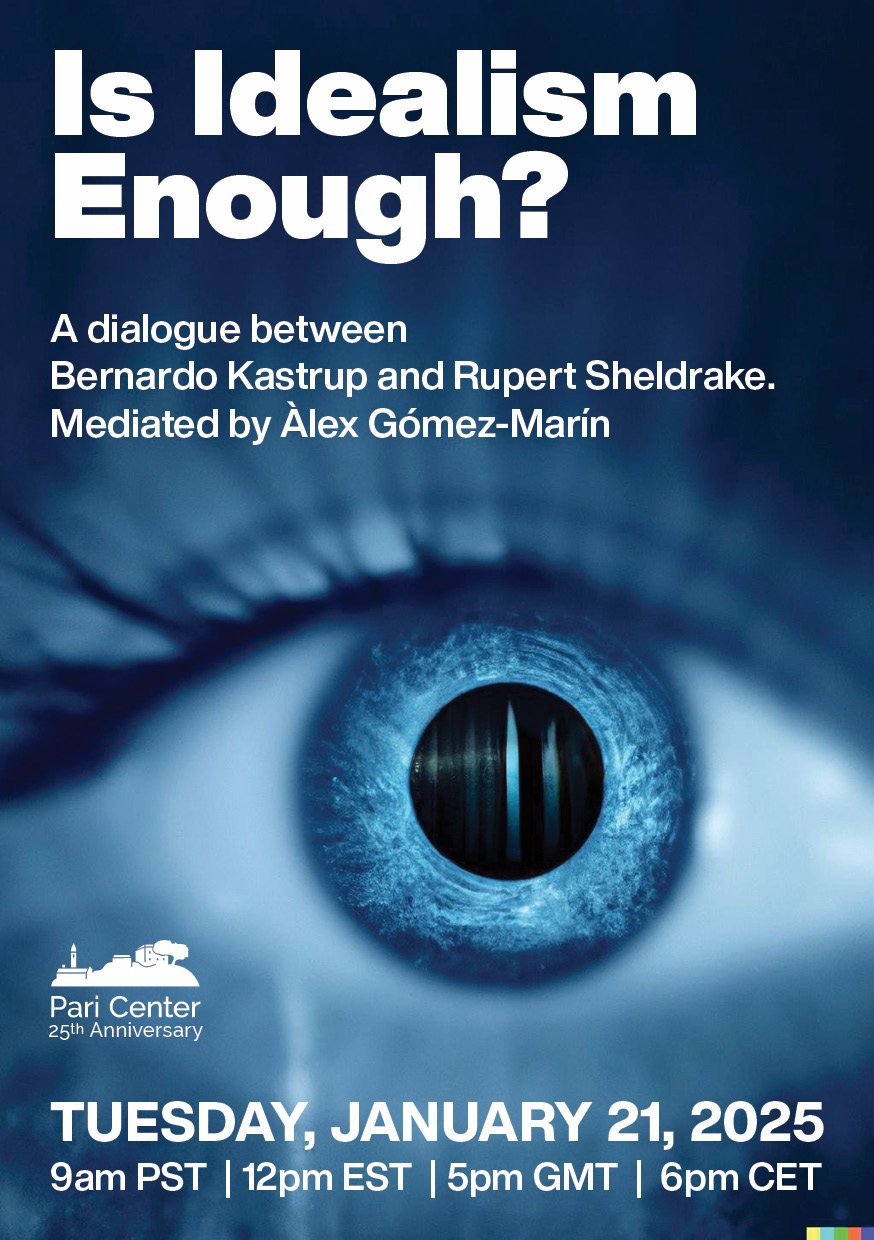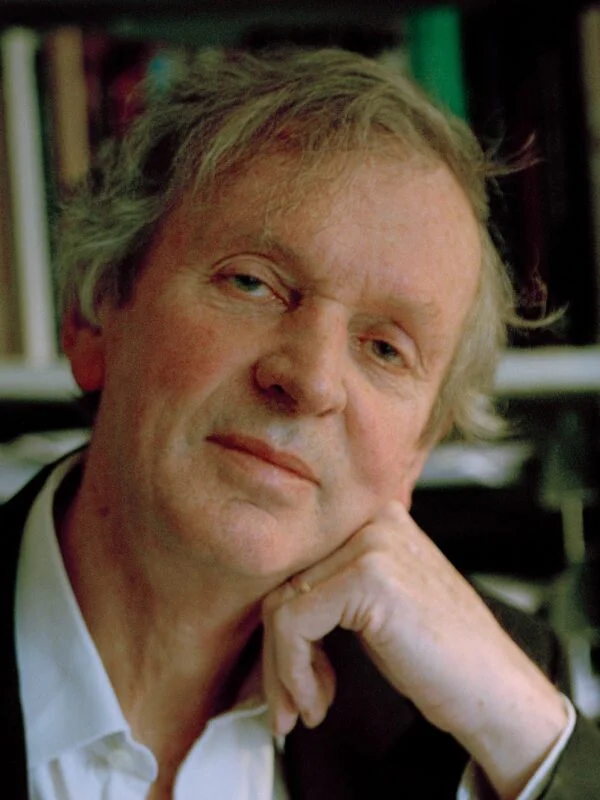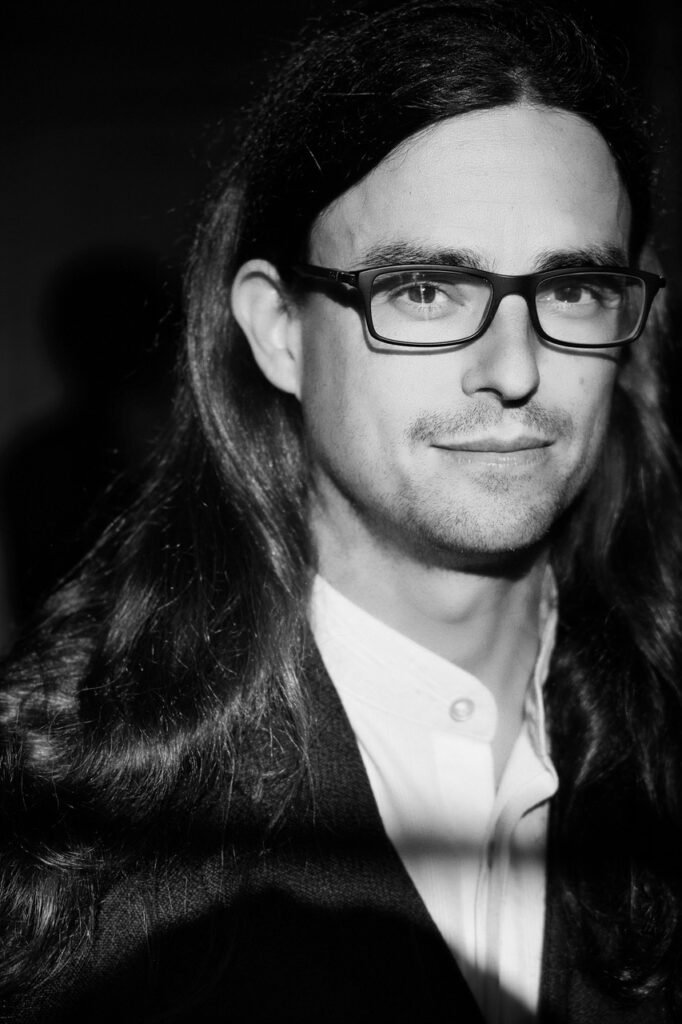Your cart is currently empty!

Is Idealism Enough?
- This event has passed.
January 21, 2025 @ 6:00 pm – 8:00 pm CET

Watch the recording
Donate to the Pari Center
We could not exist without the generosity of our supporters, sponsors and friends. Donate even a small amount, to help support us financially and enable us to continue our work.
By clicking on the Donate button, you will be taken to the payment screen.
Is Idealism Enough?
A dialogue between Bernardo Kastrup and Rupert Sheldrake
Tuesday, January 21, 2025
9:00am PST | 12:00pm EST | 5:00pm GMT | 6:00pm CET
This event is LIVE and FREE. All registered participants will receive the RECORDING.
Rupert Sheldrake recently made a series of criticisms of Bernardo Kastrup’s Analytic Idealism on Curt Jaimungal’s Theories of Everything channel. Kastrup soon responded to Rupert’s points and subsequently Rupert sent Kastrup a rejoinder. Here, in a spirit of true collegiality and intellectual pursuit, we will turn this clash into an opportunity to better understand each other’s position and inquire further into the nature of reality itself. The trialogue between Kastrup, Sheldrake, and Gomez-Marin will be followed by Q&A from the audience.
Links
1. Sheldrake’s criticisms
2. Kastrup’s responses
https://www.bernardokastrup.com/2024/11/response-to-rupert-sheldrakes.html
3. Sheldrake’s rejoinder
https://www.bernardokastrup.com/2024/12/rupert-sheldrakes-rejoinder.html

Rupert Sheldrake is a biologist and author of more than 100 technical papers and twelve books, including Science and Spiritual Practices. A former Research Fellow of the Royal Society, he studied natural sciences at Cambridge University, where he took a Ph.D. in biochemistry, and philosophy at Harvard University, where he was a Frank Knox Fellow. He was a fellow of Clare College, Cambridge, and director of studies in cell biology. From 2005-2010 he was director of the Perrott-Warrick Project, funded by Trinity College, Cambridge, for research on unexplained human and animal abilities. He is currently a fellow of the Institute of Noetic Sciences, near San Francisco, and also of Schumacher College, in Devon. For more information, please visit https://www.sheldrake.org/

Bernardo Kastrup is the executive director of Essentia Foundation. His work has set off the modern renaissance of metaphysical idealism, the notion that reality is essentially mental. He has a Ph.D. in philosophy (ontology, philosophy of mind) and another Ph.D. in computer engineering (reconfigurable computing, artificial intelligence). As a scientist, Bernardo has worked for the European Organization for Nuclear Research (CERN) and the Philips Research Laboratories (where the ‘Casimir Effect‘ of Quantum Field Theory was discovered). He has also been creatively active in the high-tech industry for almost 30 years now, having co-founded parallel processor company Silicon Hive (acquired by Intel in 2011) and worked as a technology strategist for the geopolitically significant company ASML. Bernardo has most recently started AI hardware company Syncthetics B.V., currently in stealth mode. Formulated in detail in many academic papers and books, Bernardo’s ideas have been featured on Scientific American, the Institute of Art and Ideas, the Blog of the American Philosophical Association, and Big Think, among others. Bernardo’s 11th book, coming in 2024, is Analytic Idealism in a Nutshell: A straightforward summary of the 21st-century’s only plausible metaphysics. For more information, freely downloadable papers, videos, etc., please visit www.bernardokastrup.com.

Àlex Gómez-Marín (Barcelona, 1981) is a Spanish scientist, a theoretical physicist turned neuroscientist investigating human consciousness. He holds a bachelor’s degree in physics, a masters in biophysics, and a Ph.D. in theoretical physics from the University of Barcelona (cum laude by unanimity and Outstanding Doctoral Thesis Award in 2009). He was then a postdoctoral research fellow at the Systems Biology Unit of the EMBL-CRG Center for Genomic Regulation and at the Neuroscience Programme of the Champalimaud Center for the Unknown in Lisbon. Since 2016, he has been the director of the Organism Behavior Laboratory at the Institute of Neuroscience in Alicante, where he is currently an associate professor at the Spanish National Research Council (CSIC). Since 2022, Alex is also the director of the Pari Center in Tuscany, Italy. Amongst other duties, Alex is an associate editor of Organisms: Journal of Biological Sciences, a member of the history committee of the Spanish Society for Neuroscience, a member of the science advisory committee of the Cobb Institute, a member of the scientific advisory board of the Dutch Brain Interface Initiative, a member of the Global Consciousness Project 2.0 research team, a team member of the Terminal Lucidity Research Group, a faculty member at the Icloby International Consciousness Lobby Foundation, a member of the research committee of the Wake Up Institute, an external advisor of UAP Digital, and a member of the postmaterialist Open Sciences group. His research encompasses the origins of the arrow of time (inert matter), neuroethological principles of action and perception across species from flies and worms to mice and humans (living matter), and robotic and artificial intelligence applied to human stupidity (so-called artificial life & mind). Alex had a near-death experience in March of 2021. He then decided to devote his research efforts to the scientific study of human minds in the real world, concentrating on what he calls “the edges” of consciousness – a wild, weird, wonderful field where great enigma meets gross stigma. In 2023 he was awarded the first Linda G O’Bryant Noetic Sciences Research Prize. In 2024 Alex was selected as one of the world’s most inspiring people by OOOM 100. He has recently been nominated as one of ten revolutionary scientists by Feed Your Head. Since 2005, Alex has published about one hundred research articles which have been cited over four thousand times in total. Alex has given countless talks and interviews too. You can find most of his material here: https://behavior-of-organisms.org/
Alex lives in sunny Alicante, Spain, with his wife, two daughters, and a cat.
Who's coming?
864 people are attending Is Idealism Enough?
